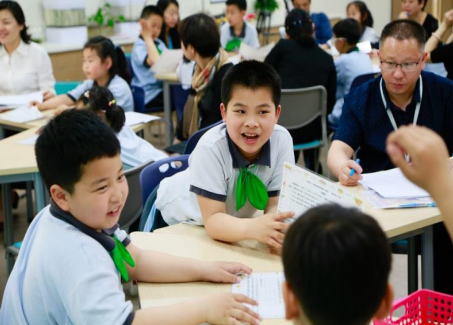When: September 2020
Where: Shanghai, Mailand China
Institutions: NACIS, and Minghang Zhu Di School
Text: Last Stop on Market Street (Minghang Zhu Di School)
Start with Why
Principal Sue is an experienced principal who cares about language learning and the arts. Sue believes that schools should focus on nurturing children, not lifting grades; those teachers should be treated as innovators, not knowledge transferers. We work with her team to implement Pre-Texts to develop Chinese, English language learning and language arts.
We set these objectives:
We also established a steering committee to cultivate shared leadership, so that the project can also be more sustainable.
Zhu Di School is a typical public Year 1 to Year 9 school in Shanghai. It looks like an ordinary school, but its leaders have big plans. Principal Li’s vision is to enable learners to adapt to China’s fast changing pace, to realize that each person has their own value, to appreciate the meaning and value of life, and to fulfill their social responsibility. The school’s development priority is to cultivate students with passion and mission. Their Chinese language panel head has a clear mission to promote questions, inquiry and analysis. We are inspired both by the challenges of a public school and the commitment to tackle them through Chinese language learning.
What did the school do?
At Teacher level
1. Organized their primary section panel head, curriculum head, senior teachers and
teachers. Senior teachers are mentors for the junior teachers.
2. Set up a regular after-school program, which they named the 3:30 program: Language
Out Loud.
3. Introduced the 3:30 Language Out Loud program to parents via WeChat.
4. Formed a Language Out Loud Committee to set learning targets and arrange resources.
5. Selected a wide range of reading texts from fairytales, fable stories, poems to classics.
At Student level
6. Recruited students.
7. Piloted the 3:30 program.
8. Provided formative assessment and showcased learners’ performances.
Even though it is a pilot program, it has drawn nearly 200 students.
What We Learned
After reading the “Last Stop on Market Street” together, the learners were divided in groups to create group names, slogans and discuss what they wanted to create to show their understanding. They debated, laughed, gave examples and created art pieces without needing our instructions. Autopilot mode. Ms Zhang observed that each learner might have different understanding initially, but after their team discussion, they all understood more.
Pre-Texts encourages thinking, admiration and show understanding. Because learners see Pre-Texts as a game, they become more willing and daring to read, share and ask questions.
Reading becomes a pleasure. (“阅读”变成“悦读”)

To align the school’s developmental priorities, we have included assessments that:
• enable learners to demonstrate what they know, understand and can do in their learning; this includes process as well as product.
• provide information about student learning, their mastery of skills and knowledge base
and application to further their enquiries successfully.
• facilitate peer assessment where learners engage in providing feedback, admire each other’s work, learn from each other, and perhaps borrow ideas from others and enhance their own work (also see Feedback below).
• help learners understand the learning objectives, and what they need to do to improve
their work (self-assessment).
• plan for future learning experiences for the learners.
• deliver regular information for parents that enables them to support their child’s learning.
• offer the steering committee with information that allows them to enhance the program.
Portfolios
A portfolio is a collective of a learner’s work which captures the learner learning and development over a period of time. The portfolio is designed to demonstrate successes, growth, higher order thinking, creativity and reflection. It should contain a collection of different types of learning that has been gathered on a regular basis for individuals. It is an exhibition of an active mind at work. It is also a celebration of learning and will be shared with the student and parents to support their learning journey.